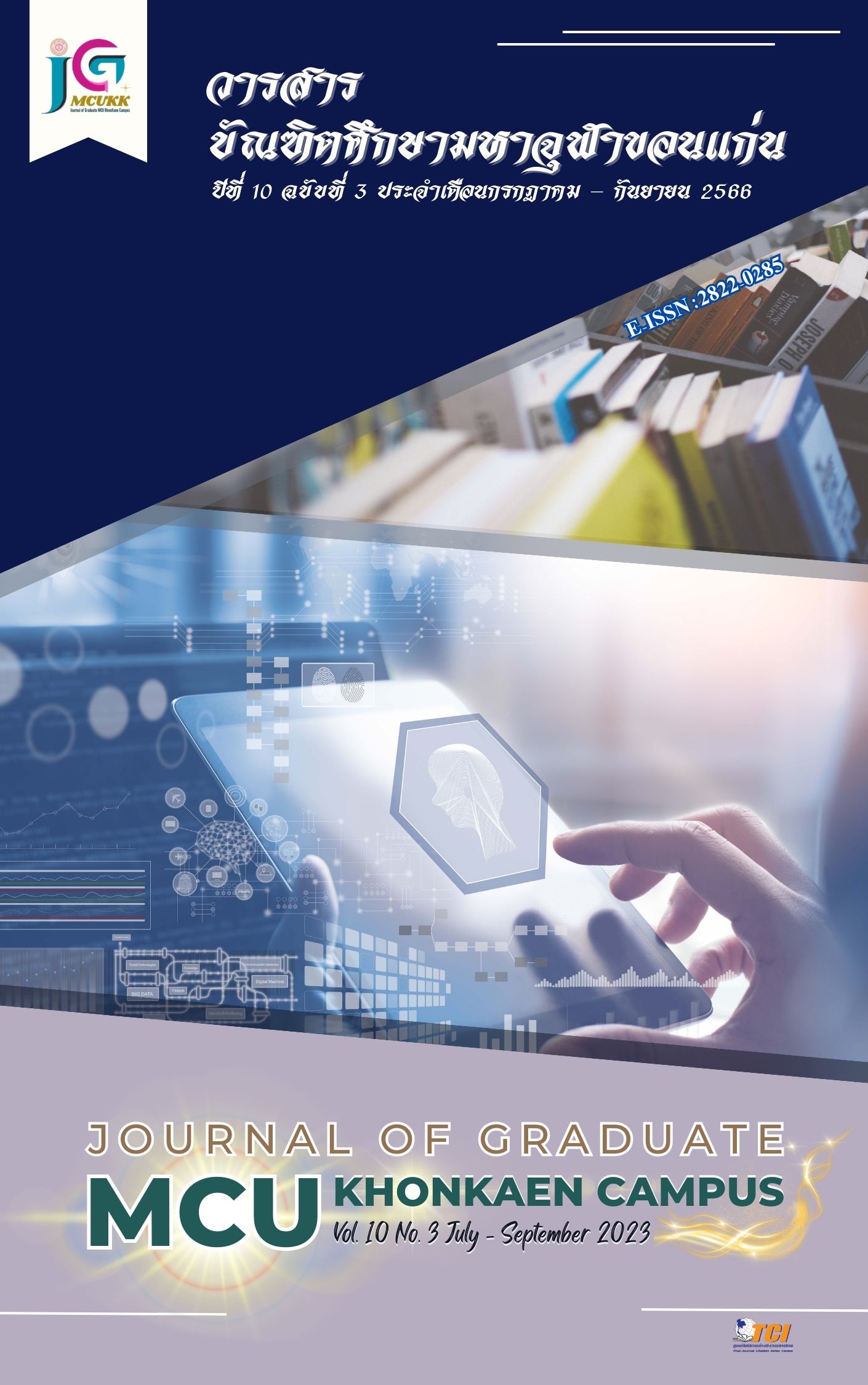การบริหารจัดการเชิงพุทธนวัตกรรมองค์กรสมัยใหม่
Main Article Content
บทคัดย่อ
การจัดการเชิงพุทธนวัตกรรม เป็นภาวะผู้นำชิงจริยธรรมควรต้องมีวิสัยทัศน์ที่ยาวไกล กล่าวคือ การส่งเสริมให้เกิดการช่วยเหลือเอื้อเฟื้อซึ่งกันและกันทั้งทางโลกและทางธรรมได้อย่างเหมาะสมในฐานะเพื่อนร่วมงาน การจัดสวัสดิการจะต้องมองเห็นถึงความสำคัญของผู้ที่เป็นคนดี เป็นผู้ที่เสียสละให้กับองค์กรมากกว่าให้ความสำคัญไปที่คนเก่งที่มีบทบาท ตำแหน่งสูง ๆ เพราะในระบบองค์กรรัฐจะเห็นระบบชนชั้นมากมาย หากภาวะผู้นำเชิงจริยธรรมไม่เห็นคุณค่าของความดีของผู้ที่เสียสละตนเพื่อคนอื่น จะทำให้ผู้ที่เสียสละเกิดความท้อแท้ไม่อยากที่จะทำความตีต่อไป ซึ่งองค์การแนวพุทธจะอาศัยทั้งวัฒนธรรมพุทธและพุทธธรรมและจะเน้นหนักในด้านจิตใจมากกว่าและต้องอาศัยซึ่งกันและกันเป็นแนวทางจะเกิดผลดีมากกว่าการที่องค์การใด จะมีความมั่นคงได้นั้น จะต้องมีคุณภาพของสมาชิก มีคุณธรรมของสมาชิก มีความสงบสุขของสมาชิก มีคุณภาพของผู้บริหาร มีคุณธรรมขอผู้บริหาร มีความสงบสุขของผู้บริหาร มีหลักการบริหารการนำองค์การปัจจัยเหล่านี้จะส่งผลให้องค์การดำรงคงอยู่เป็นเวลานาน สามารถปฏิบัติงานได้อย่างมีประสิทธิภาพประสิทธิผล คุ้มค่ากับทุนทรัพย์และแรงกายแรงใจที่ลงทุน พุทธธรรมมีแนวทางในการพัฒนาทรัพยากรมนุษย์ด้วยความเชื่อที่ว่า ชีวิต คือ การศึกษา มีชีวิตอยู่ก็ต้องมีการศึกษาตลอดเวลา คนทุกคน
ที่เกิดมาต้องได้รับการพัฒนา เมื่อพัฒนาแล้วจึงจะถือว่าเป็นสัตว์ ประเสริฐอย่างแท้จริง
Article Details

อนุญาตภายใต้เงื่อนไข Creative Commons Attribution-NonCommercial-NoDerivatives 4.0 International License.
เอกสารอ้างอิง
กีรติ ยศยิงยง. (2552). องค์กรแห่งนวัตกรรม : แนวคิดและกระบวนการ. กรุงเทพฯ: จุฬาลงกรณ์มหาวิทยาลัย.
เกียรติพงษ์ อุดมธนะธีระ. (2561). แนวคิดและทฤษฎี โดย Luther Gulick รูปแบบการบริหารจัดการ 7 ประการ (POSDCORB). สืบค้นเมื่อ 1 มีนาคม 2566, จาก https:/www.iok2u.com/indexphp/article/e book/238-posdcorb-7luther-gulick
ชลิต ผลอินทร์หอม. (2562). การใช้หลักสัปปุริสธรรมและเครื่องมือการจัดการต้นทุนเชิงกลยุทธ์ต่อความได้เปรียบทางการแข่งขันและผลการดำเนินงานของกิจการในนิคมอุตสาหกรรมในประเทศไทย. วารสารบัณฑิตศึกษาปริทรรศน์, 15(เพิ่มเติม), 32-47.
ณรงค์ นันทวรรธนะ. (2536). การบริหารงานอุตสาหกรรม. กรุงเทพฯ: ฟิสิคส์เซ็นเตอร์พานิช.
พระธรรมปิฏก (ป.อ.ปยุตฺโต). (2543). พจนานุกรมพุทธศาสตร์ ฉบับประมวลธรรม. (พิมพ์ครั้งที่ 9). กรุงเทพฯ: มหาจุฬาลงกรณราชวิทยาลัย.
พระมหาสมบัติ ธนปญฺโญ (ฉลอง) และ บรรจบ บรรณรุจิ. (2557). ยุทธศาสตร์เชิงพุทธสำหรับผู้บริหารโรงเรียนพระปริยัติธรรมแผนกสามัญศึกษา. วารสารครุศาสตร์ ปริทรรศน์ ครุศาสตร์ มหาวิทยาลัยมหาจุฬาลงกรณราชวิทยาลัย, 1(2), 93-102.
พระครูสมุห์ไพฑูรย์ พนมสวย และคณะ, 2562 . การบริหารสมัยใหม่กับการบริหารเชิงพุทธศาสตร์. Journal of MCU Haripunchai Review, 3(2), 119-120.
สุริยนต์ น้อยสงวน. (2561). รูปแบบการปฏิบัติงานสาธารณสงเคราะห์ของคณะสงฆ์ในจังหวัดศรีสะเกษ. วารสารสันติศึกษาปริทรรศน์ มจร, 6(พิเศษ), 383-394.
เสาวลักษณ์ โกศลกิตติอัมพร และ สัญญา เคณาภูมิ. (2559). หลักการเบื้องตันเกี่ยวกับองค์การและการจัดการ. วารสารวิชาการแพรวากาฬสินธุ์ มหาวิทยาลัยกาฬสินธุ์, 3(1), 170-194.
แสงอาทิตย์ ไทยมิตร. (2558). พุทธวิธีการบริหารกับจริยธรรมภาวะผู้นำเชิงพุทธในสถานศึกษา. วารสารศึกษาศาสตร์ มมร. คณะศึกษาศาสตร์ มหาวิทยาลัยมหามกุฎราชวิทยาลัย, 3(2), 13-24.
สัญญา สัญญาวิวัฒน์ และ ชาย สัญญาวิวัฒน์. (2550). การจัดการทรัพยากรมนุษย์แนวพุทธการบริหารจัดการแนวพุทธ. กรุงเทพฯ: จุฬาลงกรณ์มหาวิทยาลัย.
อาภรณ์รัตน์ เลิศไผ่รอด. (2559). พุทธวิธีบริหารสำหรับองค์กรปกครองส่วนท้องถิ่นเพื่อปรับตัวเข้าสู่ประชาคมอาเซียน. วารสารมนุษยศสตร์และสังคมศาสตร์ มหาวิทยาลัยราชภัฏอุบลราชธานี, 7(2), 341-361.
Thomas Hughes. (2022). นวัตกรรมการศึกษา. สืบค้นเมื่อ 21 กันยายน 2023, จาก https://thanetsupong.wordpress.c
Wutthirong, P. (2012). Ultimate Human Resource Management in the New Era. Bangkok: Chulalongkorn University. (in Thai)

